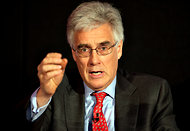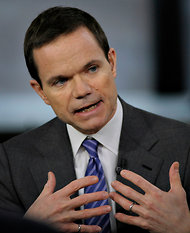 Simon Dawson/Bloomberg NewsIn a letter to Barclays, Adair Turner, chairman of the Financial Services Authority, questioned efforts to avoid taxes.
Simon Dawson/Bloomberg NewsIn a letter to Barclays, Adair Turner, chairman of the Financial Services Authority, questioned efforts to avoid taxes.
LONDON — British regulators will face further scrutiny for their role in a rate-manipulation scandal when top officials at the Financial Services Authority testify on Monday before Parliament.
Lawmakers in London and Washington have been pressing regulators over what they view as a failure to address problems with the process for setting benchmark interest rates. British politicians are expected to ask regulatory officials when they were first notified about potential issues, and why they did not stop the activities.
Documents released by Barclays indicate that the bank informed regulators about problems with the London interbank offered rate, or Libor, as far back as 2007. But the Financial Services Authority opened its investigation in April 2010.
“It wasn’t just the fault of the banks,” said Mark Garnier, a British politician who sits on the parliamentary committee overseeing testimony on Monday. “The Financial Services Authority should have picked up on the irregularities.”
Mr. Garnier predicted that the investigation “will drag on and on.”
“More banks are going to be caught up in this,” he said.
Regulators are dealing with the fallout from the multiyear investigation into how big banks set crucial benchmark interest rates, including Libor. The rate is used to determine the borrowing costs for trillions of dollars of financial products, including mortgages and loans.
In June, Barclays agreed to pay $450 million to settle claims that it reported false rates in an effort to bolster profits and deflect concerns about the bank’s financial health. The continuing investigations, by civil and criminal authorities worldwide, could eventually cost the industry tens of billions of dollars.
The Libor scandal has helped bolster the chorus of criticism against British regulators.
After the financial crisis began, lawmakers sought to blame regulatory officials for failing to see the warning signs at big banks. They accused the Financial Services Authority of narrowly focusing on banking regulation instead of looking at how banks’ activities affected the broader economy. The regulatory system “failed spectacularly in its mission to maintain stability,” the British chancellor of the Exchequer, George Osborne, said in 2010.
Since the crisis, lawmakers have moved to overhaul the regulatory system. As part of that effort, the Financial Services Authority, which oversees Britain’s banking industry, will be disbanded early next year. Its responsibilities will be divided between a new consumer watchdog and the Bank of England, the country’s central bank.
As it nears the end of its existence, the Financial Services Authority has made a big push to increase enforcement actions. In recent months, the agency has carried out raids and pursued more cases involving insider trading and other market abuses.
Earlier this year, the agency fined the prominent money manager David Einhorn and his hedge fund, Greenlight Capital, $11.3 million for trading on confidential information about a British pub chain. Mr. Einhorn denied wrongdoing but decided to settle the case rather than fight it.
“Our view on enforcement has changed radically,” Tracey McDermott, interim director of enforcement and financial crime for the Financial Services Authority, said in an interview in April. “People need to be worried about being caught. They need to think that the sanctions will be meaningful.”
But the agency could be consumed by the rate-manipulation controversy in its final months.
 Peter Foley/Bloomberg NewsJerry del Missier, who resigned as chief operating officer of Barclays this month, is scheduled to testify on Monday.
Peter Foley/Bloomberg NewsJerry del Missier, who resigned as chief operating officer of Barclays this month, is scheduled to testify on Monday.
On Monday, British lawmakers will focus on what steps the Financial Services Authority took to address problems with the way Libor was set each day.
The parliamentary committee will hear from Adair Turner, chairman of the agency, and Andrew Bailey, the head of its prudential business division, who has been tapped to run the Bank of England unit that will be responsible for banking oversight. Ms. McDermott and Jerry del Missier, a senior Barclays executive who resigned this month because of the scandal, are also scheduled to testify on Monday.
Politicians are expected to question whether top executives at Barclays responded to regulators’ concerns about the bank’s corporate culture.
Documents released by Barclays show that Mr. Turner wrote to the bank’s chairman, Marcus Agius, in April, detailing specific worries about corporate governance. Mr. Turner, in part, highlighted Barclays’ efforts to avoid paying around $770 million in taxes and questioned some of the bank’s accounting methods.
“Barclays often seems to be seeking to gain advantage through the use of complex structures, or through arguing for regulatory approaches, which are at the aggressive end of interpretation of the relevant rules and regulations,” Mr. Turner said in the letter.
Through a spokesman, Financial Services Authority officials declined to comment.
In his testimony last week, Mr. Agius, who is stepping down as chairman of Barclays, admitted that the bank had had a strained relationship with the Financial Services Authority. But he added that an agency official told him earlier this year that governance at the bank was “best in class.”
The Financial Services Authority started to hear about potential problems with Libor in 2007. At the time, a Barclays official informed the agency that other banks had not been accurately reporting their Libor submissions, according to regulatory documents.
In an April 2008 call with the Financial Services Authority, a Barclays manager indicated that the bank was understating Libor rates. “So, to the extent that, um, the Libors have been understated, are we guilty of being part of the pack? You could say we are,” the Barclays manager said, according to regulatory documents.“I would sort of express us maybe as not clean clean, but clean in principle.”
Timothy F. Geithner, then president of the Federal Reserve Bank of New York, notified British authorities about problems with Libor in 2008, according to documents. Mr. Geithner, who is now the Treasury secretary, reached out to Mervyn A. King, the governor of the Bank of England, recommending changes to the rate-setting process, including eliminating incentives to misreport Libor. It is unclear whether Mr. King passed on the New York Fed’s recommendations to the Financial Services Authority.
Despite the revelation, British and American regulators did not stop the problems. At Barclays, the manipulation of Libor continued until 2009. As the Libor investigation gained traction, officials in London were also slow to act, and at times they hesitated to investigate, according to people close to the case who spoke on the condition of anonymity. American authorities needed approval from their British counterparts to gain access to some e-mails and bank records from overseas firms.
Despite questions about its efforts to police big banks, the Financial Services Authority will continue to play a central role in the global rate-manipulation investigation. It is examining activities at other financial institutions, and some of the 14 Barclays traders implicated in the rate manipulation may face actions. The Serious Fraud Office of Britain also announced on July 6 that it would open a criminal investigation into the Libor scandal.
“Barclays’ misconduct was serious, widespread and extended over a number of years,” Ms. McDermott said when the Barclays settlement was announced. “The action we have taken against Barclays should leave firms in no doubt about the serious consequences of this type of failure.”
Article source: http://dealbook.nytimes.com/2012/07/15/focus-shifts-to-bank-regulators-in-british-rate-fixing-inquiry/?partner=rss&emc=rss
Speak Your Mind
You must be logged in to post a comment.